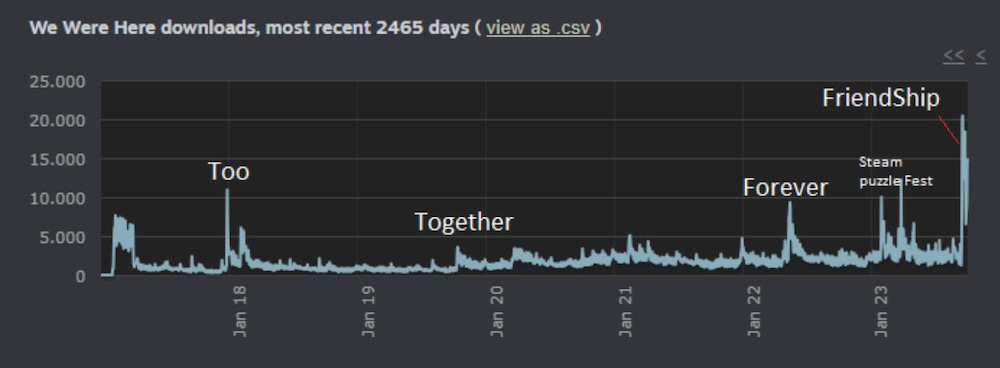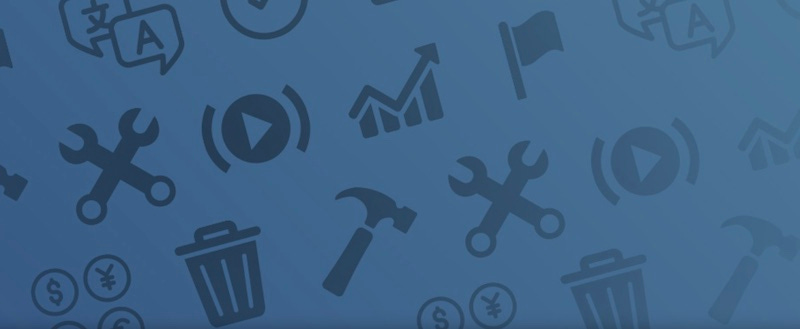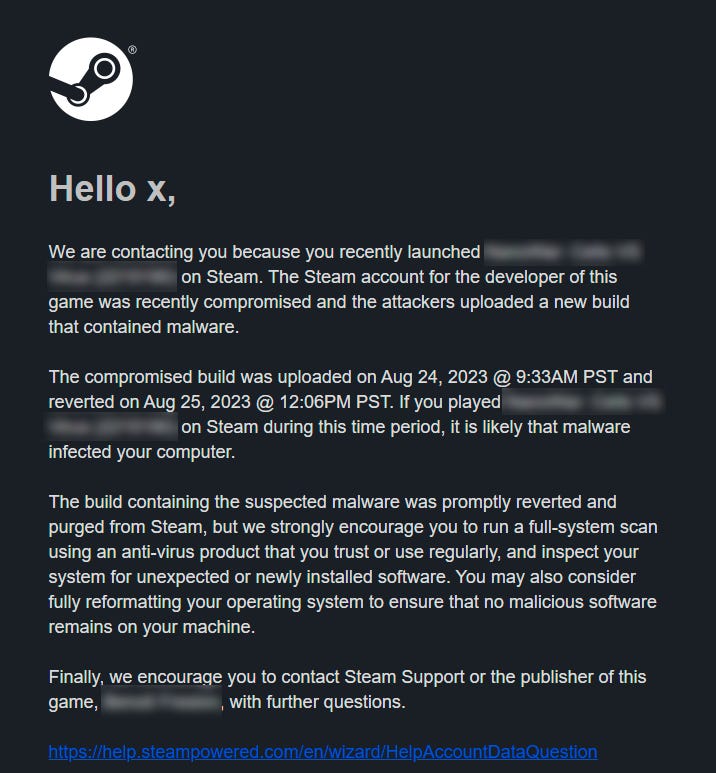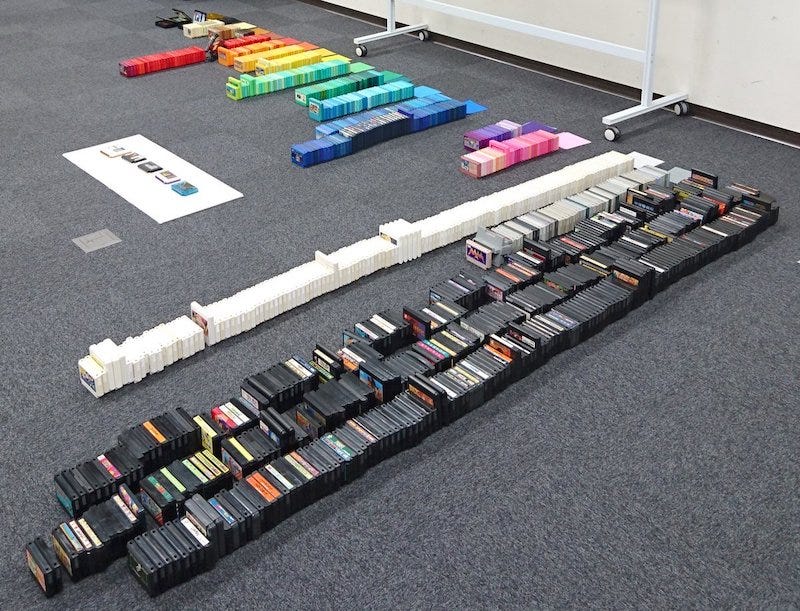The 'We Were Here' franchise gave away 7 million copies of its latest game. Why?
Publikováno: 11.10.2023
Also: why Steam's locking down your dev accounts, game discovery news galore.
[The GameDiscoverCo game discovery newsletter is written by ‘how people find your game’ expert & company founder Simon Carless, and is a regular look at how people discover and buy video games in the 2020s.]
We’re back, and it’s Wednesday - which today is soundtracked by chipmusic historian akaobi’s interesting mix of ‘juke/footwerk’-influenced chiptunes from Tokyo’s Shibuya Pixel Art festival. (You know, bleepy video game soundtracks, but more than that?)
Before we get started, a reminder! We can send you all this great info for free because of those who subscribe to our GameDiscoverCo Plus tier. Sign up, join the other Plus subscribers in our Discord, read the eBooks you get with membership, and get access to our Plus data suite, with tonnes of real data & tools on PC and console games.
Why ‘We Were Here: The FriendShip’ gave away 7m copies!
We think Total Mayhem’s online co-op ‘exploration & puzzle’We Were Here game franchise is one of the most ‘slept-on’ and under-discussed, given the three paid games in the franchise have now sold almost 5 million units on Steam (!).
And we were fascinated to see Total Mayhem launch a 100% free* (*at least until October 13th) addition to the series, We Were Here Expeditions: The FriendShip, and have it become a major download hit, peaking at 22,000 CCU on Steam. (It also has free PlayStation and Xbox versions - all SKUs launched on September 14th. And it dropped out of nowhere, completely unannounced until it was playable. Fascinating.)
So we reached out to Bram van Lith from We Were Here discovery partner Game Drive, and Geoff van den Ouden from Total Mayhem itself, and they told us The FriendShip had almost 7 million downloads, as of a week+ ago. (We presume it hit 7m by now!)
At this point, we had some burning questions. Why give away an entire newer game for free, and has it been good for business? Here’s what they told us:
The design of FriendShip grew out of support for We Were Here Forever: the duo says: “A year before release, we were planning to make some kind of DLC to help Forever stay current and active… but we realized that it would be better to make it accessible for everyone, including new players.” FriendShip started as a 30-minute Valentine’s Day themed giveaway, and grew into the 2 hour experience it is now.
The ‘free for a month’ strategy was about market expansion: the idea: “We wanted to break into new markets by… giving new players a taste of what the latest games in the We Were Here series could offer. [But] we wanted to make clear that this was something with value. The best way to do this… was to have a limited time free offer.”
While core players also enjoyed it, new markets were indeed reached: FriendShip is played for 90 minutes on average, and: “Our top regions were Asia, Western Europe and Latin America, which is in contrast to our regular player base which goes Western Europe, North America, Asia.” Brazil was particularly hot…
But let’s talk about concrete results. Did more players check out the other We Were Here franchise games, due to the 63 million Steam page impressions & 7 million downloads for FriendShip? There were some obvious discovery ‘wins’, like having discounted Steam bundles for the paid games viewable on the FriendShip page:
Apparently so: “We saw a very clear boost to the interest in other We Were Here games! We ran sales on the older games to take full advantage of the moment, but performance outpaced what we normally see during sales.
Every paid game saw significantly higher sales, with a massive 150% increase overall. We also saw wishlists jump too. Above all, we saw our original free game We Were Here break a downloads record!”
And here’s an annotated graph of We Were Here’s downloads, showing when the paid sequels were added. The original free game was released in 2017, and helped Total Mayhem to expand to its current 35 developers from the 6 students who released it:
So it looks like the free games have been feeding interest in the franchise over time, huh? But this has taken it to a new scale, as the devs revealed to us: “To compare We Were Here and The FriendShip: it took We Were Here 6 years and 4 months to reach the number of downloads seen by The FriendShip in 2 weeks.” Wow.
It probably helps that the We Were Here franchise was kicked off by a free game, so the devs were used to this overall concept. But we still asked the obvious question: “What would you say to people who said this was a mighty big slice of gameplay to give away standalone and free?”
And the devs admit: “Well, first off… they’re not wrong! It was something that Total Mayhem Games had to discuss internally as well, because it can be a difficult thing to pour your passion into something for a whole year and then hear it’s going to be given away for free. It’s totally understandable to be uncertain about that! So it was very important to take time to explain the bigger picture and long term strategy behind it, and make sure everyone at all levels of the studio was on board.”
Oh, and the ‘stealth launch’ of FriendShip made sense to the team, especially after the surprise launch of Hi-Fi Rush and the great reception it got. It confirmed Total Mayhem and Game Drive’s theory “you could do a game launch without the traditional months of pre-launch marketing and hype building”, as long as you have a unique angle.
In this case, the unique angle is simple - people love the We Were Here games, they’re still selling well, but a brand-new ‘bite sized’ free version could really expand the discovery window for the whole franchise. From our viewpoint - looks like it worked?
Steam is locking down your dev accounts… why?
If you have a dev account on Steam, you probably saw this new Valve announcement that, as of October 24th, “any Steamworks account setting builds live on the default/public branch of a released app will need to have a phone number associated with their account, so that Steam can text you a confirmation code... The same will be true for any Steamworks account that needs to add new users.”
Not all devs are happy with either a) the short notice or b) SMS to one phone number per account being the only option.Other complaints center around SMS vs. TOTP, the hijackability of SMS, and the fact Steam Guard already ‘protects’, to some extent.
(Here’s a good clarification from Dan Fabulich tho: “The post explains that if you use the SetAppBuildLive API, you get to tell it which Steam ID to use; each Steam ID gets its own phone number.” So there’s some flexibility in there.)
Still, this obviously happened for a reason. And thanks to SteamDB’s xPaw catching an example of it in recent monitoring, we think we know what it is: hackers stealing Steam dev credentials & using them to upload new .EXEs that contain malware:
As you can see above, Valve had to email everyone who launched this game and tell them about the hack. (The dev of this particular title reached out to us on Twitter and confirmed: “I'm the developer of this game. ALL my accounts were hacked by a Token Grabber Malware”.)
Thus far, no major games have been affected. But we know of demos of unreleased games that got ‘malware’-d too. So it’s even an issue if your game isn’t out yet (or is long retired!) And it looks like Steam’s locking down before there’s a bigger incident.
Often, Discord is a vector for these attacks, with - in the linked example here - a friend’s account getting hacked and prompting via DM to open a .exe file. (Or sometimes, attackers say they’re indie devs and get you to open an Itch.io-uploaded file that they claim is a game for you to evaluate.)
Discord is being more active in combating server hijacks on its own platform, with an option for all mods/admins to have mandatory 2FA - which you should consider. But active exploiting of Steam login tokens for devs wasn’t something that happened much before 2023. So we understand why Valve’s trying to find ways to stop it.
The game discovery news round-up..
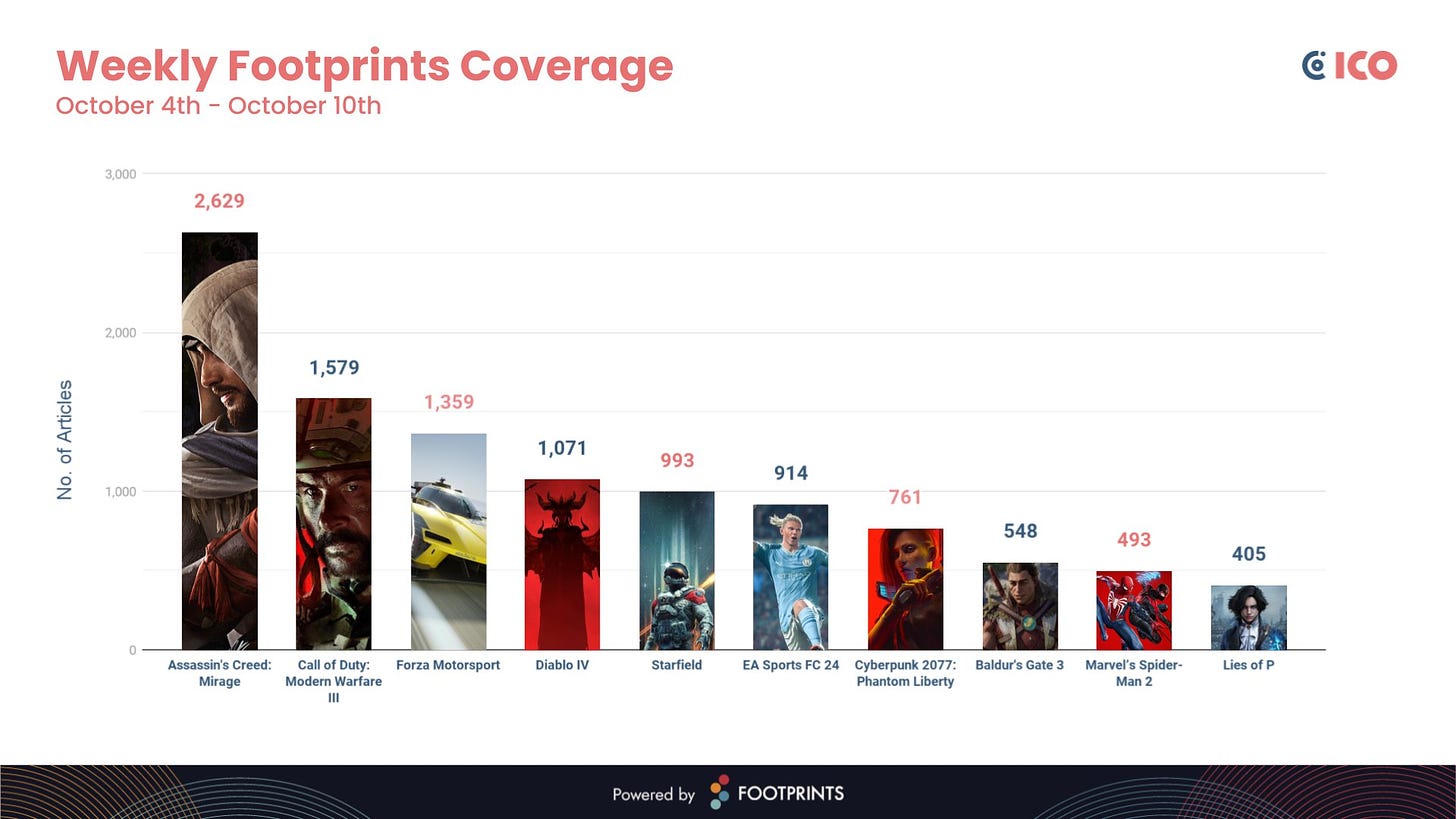
Here is an intro for the section of the newsletter where we tell you about discovery news. This is the end of the intro:
PlayStation has officially announced its redesigned PlayStation 5, which will replace all current models, and is “reduced in volume by more than 30%, and weight by 18% and 24%.” It has clever features - you can later add a UHD Blu-Ray drive to the discless version, which is $449 ($50 more than the old digital PS5). And Japan had an all-around price hike alongside the news. It’s a classic mid-cycle refresh!
Wondering when those Activision Blizzard games are popping up on Game Pass, given the Xbox deal may close soon? Activision just Tweeted about it, saying: “While we do not have plans to put Modern Warfare III or Diablo IV into Game Pass this year, once the deal closes… we anticipate that we would begin adding games into Game Pass sometime in the course of next year.”
After all those Unity engine biz model problems, it may not be 100% surprising that John Riccitiello is immediately ‘retiring’ from the company, and has been temporarily replaced by former Red Hat CEO James M. Whitehurst. (The company’s need to better monetize its top engine users still exists, though.)
Analysis microlinks: why we don’t talk about Star Citizen enough as a ‘masterclass’ in game marketing (!); are the ongoing layoffs in games indicative of a wider issue in the games industry?; why Blade Ball is the latest UGC to take off on Roblox, with an impressive 285k CCU at peak.
The highlight of the latest Superjoost newsletter on ‘platform power by the numbers’ is a graph comparing game platform & publisher revenue from 2012 to 2022: “In 2022 [platforms] account for 8 out of the 10 largest firms in gaming worldwide, compared to a more even 5 out of 10 a decade earlier.” Some are both platform & publisher, but the big-picture point - platforms are ‘winning’ - is a great one.
Other PlayStation things: some of the top PlayStation downloads for September 2023 include EA Sports FC 24 (PS4) and My Hero Ultra Rumble (F2P); PS5 cloud streaming launches this month for PlayStation Plus Premium members; the PS+ Game Catalog games for October include Gotham Knights & Disco Elysium: The Final Cut; and Roblox is finally out on PlayStation.
Former Epic employee (and SteamSpy guy) Sergei Galyonkin started blogging about his experiences helping monetize Fortnite, laying out a handy framework for PC/console IAP: “Social - things that affect the experience of playing with others; Utility - gameplay affecting items and mechanics that make the game more convenient, deeper, and different; Vanity - anything that makes the user stand out.”
The Xbox Series S being slightly underpowered has come up again, this time in comments from Remedy’s Thomas Puha: “[As for the] Series S, the CPU is pretty much the same as on Series X, but the GPU is an issue. It really is. And then, having less memory is a pretty big problem.” (Alan Wake 2 does run at 30FPS on Series S, but won’t “utilize the performance mode offered on PS5 and Series X systems.”)
Here’s an interesting IGN op-ed commending ‘half-sequels’ like Uncharted: The Lost Legacy and Cyberpunk 2077’s Phantom Liberty expansion: “I’m a fan of these kinds of not-quite-full game, not-quite-DLC experiences. And with AAA game development now expected to take longer than ever, these half-sequels might be a way to address a potential new release shortage.”
Mobile-ish microlinks: Netflix adds Slayaway Camp 2: Netflix & Kill and Dead Cells: Netflix Edition to its ‘free with a Netflix sub’ iOS/Android offering; ‘Chinese gaming giant miHoYo wants to avoid Apple’s 30% revenue cut. Can it succeed?’; Q3 2023 in mobile hypercasual / hybridcasual is headed by My Perfect Hotel.
Finally, would you like to see a statistical representation of the colors of Nintendo Famicom (NES) carts in Japan, using 1,000+ actual game cartridges? Of course you would, and Eastern Mind has the details - ‘black, white, gray’ are the top 3 winners:
[We’re GameDiscoverCo, an agency based around one simple issue: how do players find, buy and enjoy your PC or console game? We run the newsletter you’re reading, and provide consulting services for publishers, funds, and other smart game industry folks.]

